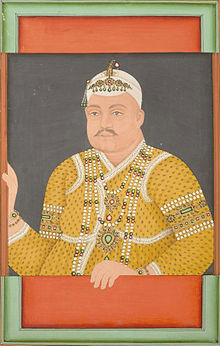| Farqunda Ali Khan | |
|---|---|
| Nizam-ul-Mulk | |
 Nasir-ud-Daulah | |
| 7th Nizam of Hyderabad State | |
| Reign | 24 May 1829 – 16 May 1857 |
| Predecessor | Sikandar Jah |
| Successor | Afzal-ud-Daulah |
| Born | Mir Farqunda Ali Khan 25 April 1794 Bidar |
| Died | 16 May 1857 (aged 63) |
| Burial | |
| Spouse | Dilawar-un-Nisa Begum[1] |
| Issue |
|
| House | Asaf Jahi |
| Father | Sikandar Jah |
| Mother | Fazilat-un-Nisa Begum |
| Religion | Islam |
Mir Farqunda Ali Khan (25 April 1794 – 16 May 1857) commonly known as Nasir-ud-Daulah, was seventh Nizam of Hyderabad, a princely state of British India, from 24 May 1829 until his death in 1857.
Born as Farqunda Ali Khan to Nizam Sikandar Jah and Fazilatunnisa Begum, Nasir-ud-Daulah ascended the throne in 1829. He inherited a financially weak kingdom. On his request, Lord William Bentinck withdrew all of the European superintendents of civil departments and followed a policy of non-intervention in the Nizam's affairs. The Nizam founded the Hyderabad Medical School in 1846; he also owed large debts to the Arabs, the Rohillas and the British, and in 1853 he signed a treaty with the British during the reign of Governor-General The Earl of Dalhousie. The British agreed to liquidate all of his debts in return for ceding part of his territory to the British.
- ^ Bilgrami, S.A.A. (1992). Landmarks of the Deccan: A Comprehensive Guide to the Archaeological Remains of the City and Suburbs of Hyderabad. Asian Educational Services. p. 36. ISBN 978-81-206-0543-5.